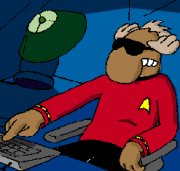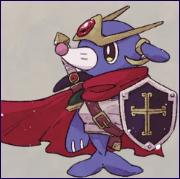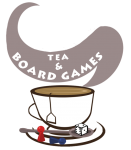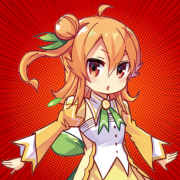|
homullus posted:I don't think what you said is true at all. I can see Pulp Fiction and say "that's a good movie" and not enjoy it (I did like it -- just sayin'). It is possible to enjoy a bad game and not enjoy a good game; a good game does not require house rules, or people who are uncritical, or people who have a PhD in ludology, or rabid fans of the game's theme/flavor, or "the right group" to be good. A good game is well-paced, balanced, and achieves the goals it sets for itself. It's possible I mis-interpreted the point of his bolded statement (well, okay, very likely). I agree with your defenition of a good game, but then you run into the problem of how do you define if a game is well-paced, balanced and achieved its goals? Once again, the first two points boil down to playgroup, I find. I've met people who say that Twilight Imperium is well-paced, and people who say that Munchkin is balanced (though in this case it was "It's balanced because the game expects you to be kneecapping each other left and right, and working together to kill whoever's turn it is"). As far as "goals it set for itself", I worry whenever a game's goal list doesn't list "Be entertaining and/or fun" as goal 1. I've played a few games in my time where the game was balanced, well-paced, and met its goals, but none of us actually enjoyed the experience. Partially because one person had all-but-won on turn 3, meanwhile the game took 30-40 turns to complete. As for Talisman, a friend of mine gave me a copy of the 2nd ed. of it tonite as a belated birthday gift (almost complete, missing a few gold pieces tokens). I've taken a quick look through the rules, it's fairly straightforward, a bit 80s mindset with some of the rules (yeah, probably going to houserule the d6, move that many squares rule to be move up to d6 squares). The podcast Flip The Table brought up the point of alot of games in the 80's seemed to suffered from a "This is the norm" mindset with their rules, and it wasn't until later that they broke away from that, so it may be interesting to see how much of the game that one rulechange fixes.
|
|
|
|

|
| # ? Apr 28, 2024 06:38 |
|
Lorini posted:We don't make anyone stay in a game they don't want to be in, particularly LW. Yeah, but nobody wants to be a quitter, especially if doing so would break the game for the people who still want to play. Trynant posted:The whole "it's not a game" or "barely a game" stuff is referring to the interactivity of these games. Basically there's very little decision-making in a game like Talisman or Monopoly--you can go turns without actually making a choice. That sucks. I hope I'm not being labeled a "Munchkin advocate", seeing as I haven't played the game in forever and don't have any particular desire to do so. I'm more trying to tease out how much random chance is considered acceptable. The point about decision-making is a good one though. That said, someone else said a "whole generation" would consider Monopoly good. Who? Who are the Monopoly fans? Literally nobody I know likes playing Monopoly. It's something Grandma buys for the kids, but she would never play it herself. Even before I and my friends got into modern board games Monopoly was always the most-hated board game.
|
|
|
|
Farmer Crack-rear end posted:That said, someone else said a "whole generation" would consider Monopoly good. Who? Who are the Monopoly fans? Literally nobody I know likes playing Monopoly. It's something Grandma buys for the kids, but she would never play it herself. Even before I and my friends got into modern board games Monopoly was always the most-hated board game.
|
|
|
|
Farmer Crack-rear end posted:I hope I'm not being labeled a "Munchkin advocate", seeing as I haven't played the game in forever and don't have any particular desire to do so. I'm more trying to tease out how much random chance is considered acceptable. The point about decision-making is a good one though. Nobody here thinks a game can be perfect (except maybe BL with Space Alert). But there's a pretty well established list of "bad things" in boardgames, and the worst games typically have a bunch of those flaws. In the case of randomness, even a high amount of randomness is okay as long as there are mechanics that mitigate that fact. Your previous mention of Poker is actually a really good example of that. Talisman's randomness has virtually no mitigation, and it's the central mechanic of the game. Somebody made a joke that you could essentially replace the deck with a die roll each turn (1=bad thing token, 6=good thing token), but it's mostly true. On a side note, unnecessary complexity is widely considered to be another one well established "game flaws", and it was something that was HUGE in 80's games.
|
|
|
|
Locomotive Werks specifically won't break if people leave, although the only time this happened we went from four to three. It's really not that hard to stay in the game but like I said it is possible to be out of the game early on. The game will be released by Queen Games in August by the way.
|
|
|
|
Randalor posted:It's possible I mis-interpreted the point of his bolded statement (well, okay, very likely). I agree with your defenition of a good game, but then you run into the problem of how do you define if a game is well-paced, balanced and achieved its goals? Once again, the first two points boil down to playgroup, I find. I've met people who say that Twilight Imperium is well-paced, and people who say that Munchkin is balanced (though in this case it was "It's balanced because the game expects you to be kneecapping each other left and right, and working together to kill whoever's turn it is"). I still remember my parents' Yahtzee box claiming it was "a game of skill and chance" which is strictly speaking true, but "chance" should come before "skill" and be written in a font 12x the size. I don't think "balance" is a matter of group. To use a toy example, my grandparents' old Rock'Em Sock'Em Robots had a problem: the red robot's head popped up wayyyy more easily. That is an example of poor balance because a player who knew could always choose blue and had an advantage for every match. Saying that the better player can choose red as a handicap is a houserule, not balance. You see what I mean, right? A "good game" would allow any given player an equal chance to win with either plastic man. I'm not arguing for symmetrical design (though clearly the plastic robutts are supposed to be identical), just balanced. If the blue guy's arm only punched half as fast, it might be ok. Well-paced is definitely more subjective -- a game you don't like will feel too long no matter how long it is -- but another movie analogy: even with a good movie you're not enjoying, you can still usually tell whether you're seeing things that keep the film moving forward, either in plot or in characterization (ignoring movies like Memento or Pulp Fiction where things can be confusing). Likewise, in a good game, you can usually tell whether you're moving toward a resolution at a controlled pace. Yahtzee is well-paced because it ends when everyone's sheets are filled and they usually fill at the same rate. Talisman is a game that can even be all-but-won in character selection with just the core set; if one player gets the Elf, another the Dwarf, and a third the Prophetess, I'd bet the prophetess would win 75% of the time. That is ungood design. Free Talisman tip: if you are in the lead, go for the Crown of Command as soon as you can. Nearly every time I've ever played, one reason it took even longer than its already-too-long playtime was that the presumptive winner waited until the inner ring literally was a foregone conclusion. Depending on your items, you can sometimes even go all the way to the penultimate square when you don't even have a talisman yet, and just plan on getting one/taking one from somebody from there (ease depending on which expansions you have).
|
|
|
|
Farmer Crack-rear end posted:
Ok, so "whole generation" was an exaggeration. I'll concede that one. However, I'd just like to point out that you and your friends have good taste. My younger self believed Monopoly to be really fun. One of my friends (who has played Dominion, Chaos in the Old World, etc.) suggested we play Monopoly last time I saw him. There are people, and they're not nearly as uncommon as you would think. I'd also like to point out that McDonald's does a Monopoly-based promotion for a reason. Probably nostalgia, but nostalgia has to come from somewhere.
|
|
|
|
OmegaGoo posted:Ok, so "whole generation" was an exaggeration. I'll concede that one. Without getting into a conversation of the quality of Monopoly, a lot of people like it because it's associated with (perhaps on a subconscious level) talking and laughing. If you ask people why they liked the game they generally give an answer involving how much fun it is to play with their friends. This is completely fine, and even good that the game facilitates it as well as it does, but very rarely will you get actual mechanical explanations for why it's enjoyable.
|
|
|
|
Paradoxish posted:My biggest problem with Innovation is that it always leaves me feeling like it pulled a bait and switch. It seems like it should be a deep game, and I'm always tempted to strategize like crazy when I'm playing, but in reality the sheer number of card effects and potential interactions make the game incredibly shallow. With Innovation, it sort of forces you to be more tactical rather than strategic. You HAVE to react to other players. If you stick with a particular game plan from the outset of the game, you're not likely to win unless everyone else is playing the exact same way. Fortunately, the dogmas most often times effect everyone, so it forces most people to react whether they want to or not. It does make a great dueling game.
|
|
|
|
Countblanc posted:Without getting into a conversation of the quality of Monopoly, a lot of people like it because it's associated with (perhaps on a subconscious level) talking and laughing. If you ask people why they liked the game they generally give an answer involving how much fun it is to play with their friends. This is completely fine, and even good that the game facilitates it as well as it does, but very rarely will you get actual mechanical explanations for why it's enjoyable. That, and there's a case of groupthink that spans our entire country. Monopoly is supposed to be the game of brilliant negotiations and deals and stuff, not just a crappy dice game. Does anyone in this thread have an interesting story about a master plan they hatched in Monopoly? Never mind that I've seen more interesting and complex trade negotiations in Catan than Monopoly: people still think it happens and that it's the basis for the game's popularity. Either they forget how their last game went (because it's been months/years since they last played), or else they just figure they were doing it wrong and THIS TIME FOR SURE they'll hit on some brilliant idea to win all the money. (Capitalism analogies are left as an exercise for the reader.) Edit: And I think this is a point a lot of people miss in talking about Monopoly. They focus on the crappy game Monopoly actually is, especially by modern standards, which admittedly is bad enough. But it also had some design goals; it's trying to be a very different game, and in that respect it just fails miserably. Even if you play with the proper rules, or come up with hot new houserules, or whatever it takes to fix the concrete problems with pacing and luck and so forth, it's never actually going to be the game that people think it is when they say "Let's play Monopoly." Has everyone played Mouse Trap? You know how the actual board game sucks, even by kids' standards, and it's just an excuse to play with the trap? Imagine your Mouse Trap set is missing most of the pieces so you can't actually build the trap, but you're still playing the game part. That's what Monopoly is. McNerd fucked around with this message at 21:52 on Jul 31, 2012 |
|
|
|
McNerd posted:That, and there's a case of groupthink that spans our entire country. Monopoly is supposed to be the game of brilliant negotiations and deals and stuff, not just a crappy dice game. I'll just put this here since nobody else has yet in this thread, I think. Monopoly was not supposed to be a game of brilliant negotiations originally; it was supposed to be "practical demonstration of the present system of land grabbing with all its usual outcomes and consequences", i.e. a ball of suck for everyone except the winning player. It succeeds admirably at this (or would if people caught on to that theme); how it's now perceived is a whole other cautionary tale of marketing and nostalgia.
|
|
|
|
homullus posted:I'll just put this here since nobody else has yet in this thread, I think. Monopoly was not supposed to be a game of brilliant negotiations originally; it was supposed to be "practical demonstration of the present system of land grabbing with all its usual outcomes and consequences", i.e. a ball of suck for everyone except the winning player. It succeeds admirably at this (or would if people caught on to that theme); how it's now perceived is a whole other cautionary tale of marketing and nostalgia. Monopoly is a kaleidoscope of comedy because the same horrible business practices that the original game protested were used to steal the product from the original designer, bully better games off of shelves, and ruin each individually played game to this day. The whole thing is a historical shitstorm, yet it's respected purely out of blind nostalgia.
|
|
|
|
Broken Loose posted:Monopoly is a kaleidoscope of comedy because the same horrible business practices that the original game protested were used to steal the product from the original designer, bully better games off of shelves, and ruin each individually played game to this day. It gets better. The cost price of a Monopoly set is only pennies less than the retail price. So while shops have to stock it because it's Monopoly, they make zero profit from it.
|
|
|
|
Broken Loose posted:Everything else has been tackled, so I'll single this bit out. You heard it here first, folks. Never change, BL. Not to fan the flames (I guess?) any further, but I do think the definition of a good game is what's causing all the discussion. Why not say a "worthwhile" game? That implies a subjective value, at least. Entertainment products are entertainment products--there's always going to be someone who loves bands you think all sound the same, but that doesn't mean music you don't like is therefore objectively bad. Those bands are just doing things counter to what you think music should sound like. There's people into stuff I wouldn't even call music, but they seem to dig it, so live and let live. People have different criteria for what a worthwhile game is. I'm probably just as discerning a board game hobbyist as anyone in this thread, but all those hideous flaws that get cited as reasons to not play a particular game (and the vocal people in this thread would probably consider the vast majority of board games that exist unplayably flawed), I find interesting. I like the history of our hobby, I like exploring the B and C list of games that have a neat premise and maybe fall a bit short when it comes to execution. I get a thrill tracking down weird games like Temple of the Beastmen or Dinosaurs of the Lost World. I enjoy obscure, "flawed" games nobody's played before or even heard of. I don't mind collaborating with the other players to define an ambiguous rule, or to add new rules to fix things we don't like, or to create entirely new tables for Warhammer Quest. I get that you don't consider any of that stuff as part of the game itself, I guess, but all of that is definitely part of the reason why I play games. I think you guys just place more of the value strictly on the things inside the box than I do. I'm paraphrasing from a number of posters, but it seems like the thread's definition of a worthwhile game is one that is balanced, involves meaningful player choice, and offers a predictable play experience(not trying to use this pejoratively--what I mean is, the quality of the players doesn't matter, because the game delivers the same thing regardless of who is playing it). I can accept that by that definition, many of the games I love are bad games that YOU would never want to play--but can you really say that NOBODY should play them? That they're somehow a blight on the hobby? That they should never be recommended because you personally don't find them worthwhile? For the Tales vs. Talisman thing, I get what you're saying. I love Tales, and in fact, I have the German version that I had to make paste ups for, and then get the PDF file from a translator guy on BGG and print the Tale Book out at Kinkos--I actually found some really sweet cover art for it--several years before Zev reprinted it. But I never remember what happens to my character in Tales after the turn is over--nothing really stays on the board, and unless you have a really good memory, it's hard to even remember WHO cursed you or WHY you're insane. I recognize this could just be my own lovely memory, but in Talisman, things stay on the board, and so certain sides of the board become dangerous in some games due to deadly monsters that wind up there, and other times, a side becomes littered with items because someone reached their item limit and had to leave things behind. You also collect the monsters you killed as trophies, so when you turn them in for a Strength boost, you're reminded of what you've slain. But fundamentally, they are different games. Even if you say they're both narrative, experience games, they offer different narratives and different experiences. Again, I really don't understand this idea that if you like Arkham Horror, for instance, that there's all these others games that do what it does, only better, so why not play those instead. As for King of Tokyo, yeah, I've played it. I'm not sure how it's relevant to the discussion, exactly, since I don't really see it as similar to Talisman at all. Or were you just recommending it, because you thought I'd dig it based on how much I enjoy Talisman? If so, thanks, dude. That's what this thread's good for. After all, this thread's how I found out about Relic, even if the initial post was about how disappointed they were with it.
|
|
|
|
McNerd posted:That, and there's a case of groupthink that spans our entire country. Monopoly is supposed to be the game of brilliant negotiations and deals and stuff, not just a crappy dice game. Does anyone in this thread have an interesting story about a master plan they hatched in Monopoly? I once convinced someone who was holding park place to trade me the properties I needed to complete the yellow, red, and orange monopolies for boardwalk, when I was on the first side of the board, and they were about to enter the gauntlet they just handed me. I had enough cash on hand to build up enough developments that I had relieved them of BW and PP in the form of rent before I got around to that part of the board again. I think I was 12, and I thought I was a loving genius. St0rmD fucked around with this message at 03:03 on Aug 1, 2012 |
|
|
|
St0rmD posted:I think I was 12, and I thought I was a loving genius.
|
|
|
|
A Strange Aeon posted:You heard it here first, folks. Never change, BL. That's a lot of words to tell us how you like bad games. You go on at length about subjectivity, but in the end you basically didn't say anything positive or even challenge most of what we dislike about Talisman. You can like Police Academy 3, and off-brand hot dogs, but don't try to pretend all things are equal and bad taste doesn't exist. We all have our guilty pleasures. (USER WAS PUT ON PROBATION FOR THIS POST)
|
|
|
|
Everyone in the goddamn thread posted:STOP LIKING THINGS THAT I DON'T LIKE So, the King of Tokyo expansion looks cool, eh?
|
|
|
|
So, I'm building my board game collection, because the friend in my group who owns all the games we would play has moved away. We're also in the process of building a new and larger group. I've already got Settlers of Catan, and I've ordered Dominion, which was our previous favorite. I'm planning to get Space Alert when and if it's reprinted, but I'm looking for other games to start my collection. I'd like to get something Ameritrashy, maybe cooperative, that would be a good introductory game. I know BSG was recommended in the OP, but I was looking at Fury of Dracula. Shut Up and Sit Down gave it a great review, but I wanted to know if anyone here had experience with it.
|
|
|
|
FishFood posted:So, I'm building my board game collection, because the friend in my group who owns all the games we would play has moved away. We're also in the process of building a new and larger group. I've already got Settlers of Catan, and I've ordered Dominion, which was our previous favorite. I'm planning to get Space Alert when and if it's reprinted, but I'm looking for other games to start my collection. I'd like to get something Ameritrashy, maybe cooperative, that would be a good introductory game. I know BSG was recommended in the OP, but I was looking at Fury of Dracula. Shut Up and Sit Down gave it a great review, but I wanted to know if anyone here had experience with it. The way I understand it, part of the problem with Fury of Dracula is that it is a deduction and guessing game where even if you outsmart Dracula the final result is still determined with a single die roll.Haven't played it personally though. Arkham Horror is the self-declared king of ameritrashy co-op but I strongly dislike that game, others really enjoy it though. Ghost Stories is a pretty solid co-op game, somewhat mixes Euro and Ameritrash. Also there's Defenders of the Realm which I know very little about but seems interesting.
|
|
|
|
St0rmD posted:I once convinced someone who was holding park place to trade me the properties I needed to complete the yellow, red, and orange monopolies for boardwalk, when I was on the first side of the board, and they were about to enter the gauntlet they just handed me. I had enough cash on hand to build up enough developments that I had relieved them of BW and PP in the form of rent before I got around to that part of the board again. Well done dickhead, now I kind of want to play monopoly.
|
|
|
|
Monopoly has a seed of fun in it. Either you say: 1) each property's cost is actually *twice* that printed, and we auction every property not immediately purchased; or, 2) whenever someone lands on an unowned property, it is immediately auctioned. Sure, it turns Monopoly from a roll-n-move game to an auction game, but that's what it should've been in the first place!
|
|
|
|
Agronox posted:Monopoly has a seed of fun in it. Either you say: 1) each property's cost is actually *twice* that printed, and we auction every property not immediately purchased; or, 2) whenever someone lands on an unowned property, it is immediately auctioned. Further rule changes: Each time someone passes Go, at the end of their turn auction the first property around the board that has not yet been purchased. End the game the moment someone is eliminated. Whoever has the most assets (cash, property, houses/hotels) wins. Congratulations, Monopoly is now fun! Or at least, not terrible. bobvonunheil fucked around with this message at 08:34 on Aug 1, 2012 |
|
|
|
While we're on the topic, there's a (very short-lived) thread from 2009 where we briefly discussed ways to make Monopoly into a better game. If you have archives maybe check it out (spoilers: the best solutions involved layering a bunch of mechanics on top of the game to obscure the core badness). http://forums.somethingawful.com/showthread.php?threadid=3217386
|
|
|
|
bobvonunheil posted:Further rule changes: Yes! I agree. We actually played with that first rule before and it worked very well. The second makes a ton of sense too.
|
|
|
|
I do understand your point, A Strange Aeon and since my roots of my gaming were in RPGs, I actually started out with stuff like Arkham Horror because of its proximity of that sort of game to what I used to do before. I have, though, changed my opinions quite dramatically through the years, but I still retain that core of storytelling that I've come to understand is actually something that is still present within all the games I love, but present in a different. One of the things you speak about is how the games we seem to enjoy are too predictable. To me, they aren't and I actually find the opposite to be true and that those thematic, random games are entirely too predictable, even though in the first few games they are going to appear to have a wealth of possibilities. The problem I find is that I never feel like what I read in a card actually happens to my character. The might find the lost catacomb of Fuul-Bat but I'm never going to experience that because the game itself is constricted to what is present on the board. Just reading up a card is really not good enough for me and it starts to end up that you only really care about what you receive/lose. It's one of the reasons why you never want to read your own event cards in Arkham Horror, but due to the nature of the game itself and how the cards are used in Talisman, you can never really do that. On the other hand, I think that the games I enjoy build their own narrative as the game progresses and tell a story of your own making. Yes, you might be constrained by the actions of the game itself, but the actual narrative within those constraints is fully under your control: how your farm shapes up in Agricola, the network of rails in 18XX, the ebb and flow of battlelines in Napoleon's Triumph, the rise and fall of kingdoms in Tigris & Euphrates, the creation of a castle in Caylus (the last might be slightly harder). Those are all stories that are going to be influenced by what I do. I have better stories out of those than I could ever do in Arkham Horror or Talisman (both where the theme was always the same and the details unimportant). The problem with recommending games that even you admit are sub-par is that they can potentially drive people away from the hobby before they even try something more interesting. You seem to have a niche interest (within a niche already) of games with dubious design decisions and if that's what you like, that's fine, but if the first example of a board game to someone new to the hobby is Talisman, they aren't going to change their pre-conceptions of what board games are based on a game that is stuck in the 1980s and that can be a problem. On the other hand, I don't think anyone (not even BL) is saying that if you and your group of friends enjoy playing Talisman, then it isn't worthwhile for you. Finally, you seem to have a problem with labelling of games and grouping them together in different sections. What you said about the 'but they have different themes!' can be said to be true of pretty much every single game in the hobby (unless you start going in the murky waters of 'obligatory medieval town'). Even euro games that are superficially alike and use the same mechanism could be said to be different because of theme, but the feel of the game is going to be the same. That's true even in thematic games. I can acknowledge that maybe you think that the theme makes Talisman/Arkham Horror/Tales all feel wildly different to each other, but in terms of how I approach games, they are going to feel very similar. Recommending one game over another doesn't need to be a rule that you must ALWAYS play something that is better than what you are currently playing. I'm not going to say no to Lords of Waterdeep just because I think Caylus is superior, but it shouldn't be an issue to say that they both do different things but one of them does it better. Finally, I don't really think that there is such a wide gulf between thematic games and euro games as you seem to suggest.
|
|
|
|
bobvonunheil posted:The way I understand it, part of the problem with Fury of Dracula is that it is a deduction and guessing game where even if you outsmart Dracula the final result is still determined with a single die roll.Haven't played it personally though. . Fury of Dracula can come down to a die roll, but most of the time its based on card playing (though there are a limited number of cards). Dracula has quite a bit more ability to win via cards during the night-time phase of the game (as he gets more cards to use), but during the daytime the hunters have a definite advantage. I don't believe I've ever seen a game that has come down to a single die roll to determine who won, but there is a card that Dracula can draw during the game that lets him instantly teleport somewhere else on the board. That card is really the only thing that feels out of place with the rest of the game. Drawing the card early will result in possibly a subpar movement on the board (if you're planting Vampires on the board or other good traps for the hunters to run into) and drawing the card late will result in an almost-assured dracula win, unless the players have a cancel card ready for it (and they should). That's really my only complaint of it. When you play as Dracula you get the feeling of "If someone catches my trail IM GOING TO DIE," and once they're on your trail its the equivalent of a 70s movie carchase scene plowing through alleyways full of chickencoops and cardboard boxes. As soon as night hits, you can easily turn the tables and take out a weak hunter (if you've planned for it), and generally play a considerable amount of trickery to escape. That one card is the only thing I don't like about the game because that is where the random luck in the game lies.
|
|
|
|
I have a couple questions: 1) I don't think I saw anyone in this thread ever mention Axis and Allies. How are the goons feeling about that franchise? 2) How in holy hell do I acquire a copy of Space Alert?
|
|
|
|
I havn't played much Axis and Allies but I'm not a huge fan of it, although some of the games aren't too bad (such as D-Day). I think the main issue is that it relies too much on dice rolls and the actual strategy as such (at least in the base game) is pretty sparse. Also, there's only realistically one way that the game pans out, with germany either managing to destroy Russia or not.
|
|
|
|
bobvonunheil posted:Further rule changes: That kind of makes it into an 18xx super-lite in how a train-rush will bankrupt someone ill-prepared, but more grindy and depressing (just like real capitalism  ). ).e: typo
|
|
|
|
Tekopo posted:I do understand your point, A Strange Aeon and since my roots of my gaming were in RPGs, I actually started out with stuff like Arkham Horror because of its proximity of that sort of game to what I used to do before. I have, though, changed my opinions quite dramatically through the years, but I still retain that core of storytelling that I've come to understand is actually something that is still present within all the games I love, but present in a different. Thanks for the calm, polite response. I was into rpgs and Magic before getting pretty into Euro games, but then I started really liking more thematic fare. So kind of the opposite of your experience in terms of where our tastes ended up, which is why I'm skeptical of this progression from 'bad' games to 'good'games. But either way, the hobby is big enough for everyone. I'd be curious to play some of the games you mentioned that seem to offer a rich narrative. I think most war games deliver on that count, at least the few that I've played, since the actions you take are usually straightforward; but most of my experience with Euros involves game mechanics that aren't very thematically integrated, so it's hard for me to really get into character, if that makes sense. And for the Fury of Dracula question, I wouldn't recommend it really. The two or three times I've played it lasted longer than I thought they should have. The primary mechanic is already in Scotland Yard anyway, which is a pretty solid family game. I'm pretty much a huge advocate of the old GW board games (obviously), but just never warmed up to Fury.
|
|
|
|
Two games I haven't seen mentioned here are Game of Thrones and Conquest of the Empire. My friends and I have played these a couple times a year for the past few years. We generally have fun playing them, and the cutthroat style of both seems to go well with a few beers. What are this thread's thoughts and/or critiques of these?
|
|
|
|
A Strange Aeon posted:And for the Fury of Dracula question, I wouldn't recommend it really. The two or three times I've played it lasted longer than I thought they should have. The primary mechanic is already in Scotland Yard anyway, which is a pretty solid family game. Scotland Yard is really showing its age at this point, and the game's simply too easy to win if the robber knows anything at all about the most rudimentary tactics (get to three-way junction on turn 3, use a couple black tickets in a row, and you've won 90% of games). I did recently play Escape from the Aliens In Outer Space, though, and that seemed like a pleasantly fresh take on things. Everyone has their own copy of a hexgrid map, and half the players are aliens, half humans; they don't get to know who's who at the start of each game, and have to figure it out in-game. The human goal is to escape at a corner of the map, while the alien's goal is to kill all the humans - they can move twice the speed of the humans, and choose to attack any hex they land in. Each turn, you'll either land on a safe square or an unsafe square - on the latter, you draw a card and either have to reveal or lie about your location to the rest of the players, which lets you set up bluffs as to where you are or which role you happen to be. The last part's important because if you can trick one of them into attacking another then that punts them out of the game and you've got one less attacker to deal with. The site has the full rules, as well as a map editor and tools to knock up custom rules.
|
|
|
|
Tekopo posted:I havn't played much Axis and Allies but I'm not a huge fan of it, although some of the games aren't too bad (such as D-Day). I think the main issue is that it relies too much on dice rolls and the actual strategy as such (at least in the base game) is pretty sparse. Also, there's only realistically one way that the game pans out, with germany either managing to destroy Russia or not. It depends on what version. The last big one, the combination of 1940 Europe and Pacific is pretty good. There's enough income and units for most countries that small-scale battles aren't that common, at least if you choose to play it safe. Japan is generally strong enough to start taking on Russia, so it doesn't always boil down to Germany vs Moscow. There's also a few other options, such as taking the British Isles or catching the USA off-guard. But the size of the map and amount of coutnries does mean it takes about 45-60 minutes per full turn, so better make a whole afternoon/evening out of it.
|
|
|
|
Space Alert session 2 log. 4 players again, 2 from last time and 2 brand new. Trained the new players on a test flight as quickly as possible, and jumped straight to an advanced simulation. Beat that surprisingly easy without taking any damage. Moved on to a full mission for the first time. Out of the gate, no one had any C actions. This puzzled us as to what to do... if no one can wiggle the mouse everything is going to get delayed, and how are we going to plan for that? I think we just resolved to leave turn 3 blank so there would essentially be no delay (minus missing a whole turn) [assuming I understood that rule correctly]. But the whole scenario kind of threw us for a loop and we mostly just sat there doing nothing the whole first phase until we finally got incoming data near the end, someone picked up a C, wiggled the mouse turn 1, and we tried to complete phase one in about 30 seconds. Various other threats appeared eventually, but on turn 5 we got Unstable Warheads on the shortest track. We were still pretty short on C actions and while dealing with other threats we failed miserably to repair our missiles (we definitely overestimated how much time we would have) and they completely destroyed us around turn 9. We also tried out the flash turn processor: http://homedrone.110mb.com/tusatp.html While it is faster, and pretty cool to watch the animation go down, it's sort of hard to follow exactly where you screwed up (even though it shows everything). It can almost be a game by itself. I just programmed a crew of 5 to do some random but probably useful sequence of moving around the ship firing weapons and hitting B and managed to survive 3 randomly selected regular threats and 1 internal threat. Elysium fucked around with this message at 18:32 on Aug 1, 2012 |
|
|
|
Elysium posted:Space Alert session 2 log That's lovely. With 4 players I've never had a scenario in which we all lacked a certain card, but in the rare instance it does happen it would suck. I'm sure if you looked back on what cards everyone had you could find a way you could have won, but in the heat of the moment it must have been impossible.
|
|
|
|
Man, two weeks ago someone asked me to bring Puzzle Strike to the local game night. Knowing that it hadn't gone over particularly well with anyone I introduced it to and that the third edition specifically addresses many of the reasons for that, I decided to upgrade my chips. I bought the print and play to get some print resolution graphics only to find that they were riddled with JPEG artifacts. They weren't as noticeable shrunk down to chip size, and they're better than web graphics blown up, but seriously, Sirlin? Anyway, I made sure a chip with errata taped over it wasn't distinguishable by touch from a stock chip and went to work updating the (I think) 120 chips that needed it, killing a pair of xacto blades and a role of double sided tape in the process. I've got nothing on Crackbone as far as being an insane person, but it was a fairly ambitious game pimping project for one week. And then last week the guy who asked me to bring the game came in while I was in the middle of a long game and got himself into a long game that ran the rest of the night. This week he didn't show up at all. I want to play this game that I didn't like very much the last time I played it. 
|
|
|
|
Elysium posted:This puzzled us as to what to do... if no one can wiggle the mouse everything is going to get delayed, and how are we going to plan for that? I think we just resolved to leave turn 3 blank so there would essentially be no delay (minus missing a whole turn) [assuming I understood that rule correctly]. But the whole scenario kind of threw us for a loop and we mostly just sat there doing nothing the whole first phase until we finally got incoming data near the end, someone picked up a C, wiggled the mouse turn 1, and we tried to complete phase one in about 30 seconds. That's the way we play the rule. Delays also push into blank spots so actions after the gap are not delayed (which sows delicious havoc if two players are timed together, but only one of them has a gap). I would've not played the the C in phase 1 so late. If you had everything planned out for phase 1 fine, you could've saved it for C actions later on.
|
|
|
|
Unzip and Attack posted:Two games I haven't seen mentioned here are Game of Thrones Game of Thrones pops up here, from time to time. I've only played it a couple of times, but, I feel it's inherently imbalanced. Particularly for the Lannisters. They are *required* to start making deals right out of the gate, or get squished (usually by Greyjoy). If nobody wants to make a deal, poof, no more Lannister. With more games, I may understand this dynamic better, but I really don't like it now.
|
|
|
|

|
| # ? Apr 28, 2024 06:38 |
|
Nitis posted:Game of Thrones pops up here, from time to time. Pretty much this. In my gaming experience, Baratheon or Tyrell wins every time. Lanister is a speed bump. Stark is nice in theory, but usually takes too long to get moving. Greyjoy is in a fine initial position, but can't really do anything to WIN, just squish Lanister or bug Stark/Tyrell. My biggest overall gripe with it is how the random Westeros cards (3 per turn) so incredibly important for how random they are. Loading up on castles early praying for a mustering that doesn't come sucks. Bidding on influence tracks multiple times in limited turns is pretty frustrating too. No matter how non-luck-based the tactical and diplomatic elements of the game may be, the strategic mustering/power/bidding aspects are very luck-based. I don't have a problem with the cards like Dark Wings, Dark Words that allow a title holder to make a choice. I'd just rather there be a system wherein you get a certain amount of power options every turn, rather than rely on those cards. Or SOMETHING that would reduce the amount of luck in the strategic layer. Overall, it's a well-constructed, nicely thematic game. The figurines are Catan-ish, the art is pretty, and the pacing can generate some good tension/wheeling-dealing. If you don't mind it being inherently unequal, it's a fairly good time.
|
|
|








































